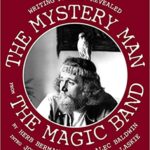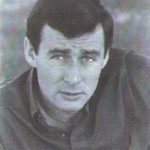The Mystery Man From The Magic Band
by Lee Greene
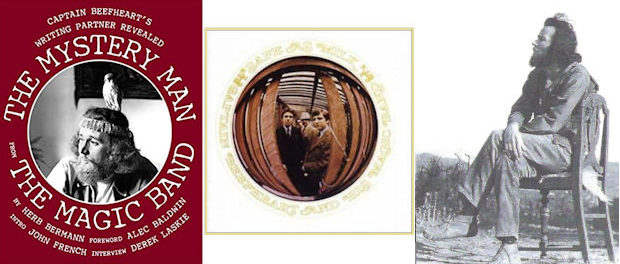 Left: Book cover of The Mystery Man from the Magic Band; Center: Album cover: Captain Beefheart debut album Safe As Milk; Right: Herb Bermann, lyricist for the debut album of Captain Beefheart and His Magic Band, photo by George Herms.
Left: Book cover of The Mystery Man from the Magic Band; Center: Album cover: Captain Beefheart debut album Safe As Milk; Right: Herb Bermann, lyricist for the debut album of Captain Beefheart and His Magic Band, photo by George Herms.
Now something a little different. Having previously reviewed numerous musical and theatrical performances and artists, today offering a review of a book, The Mystery Man From The Magic Band, which is centered around an interesting tale concerning some notable musical and theatrical performances. The Mystery Man From The Magic Band is a unique work presenting the history of a unique, notable talent, Herb Bermann.
Mr. Bermann happens to be the answer to a very long, shrouded trivia mystery: namely, who wrote the lyrics to the 1967 debut album, Safe As Milk by the avant-garde group, Captain Beefheart and His Magic Band?
“Of the 12 songs on the ‘Safe As Milk’ album 8 are co-credited to someone called Herb Bermann. Who was he? No-one at the time seemed to know, he wasn’t a member of the band, he didn’t co-write any songs on the following albums and he was never mentioned in interviews. Very strange. Some fans thought he may have been an anonymous staff-writer foisted on Beefheart to keep the lid on his eccentricity … or, maybe, he was a friend of the producer or an agent getting a cut of the royalties.
Then when ‘Shiny Beast’ was released in 1978 there he was again as co-writer of ‘Owed T’Alex’. Although some thought Don had been working with this mystery man again, the most likely scenario was that this was a song written almost ten years previously alongside those ‘Safe As Milk’ tracks.
Despite Bermann’s name reappearing nothing new was found out about him. As years went by little more came to light. In fact, some people close to Beefheart during the ‘Safe As Milk’ days even suggested that Herb Bermann was an invention of Don’s and didn’t exist. This did seem to be a possible option as nothing could be discovered about him … not even a mention on the internet (apart from a New York artist called Herb Berman – one ‘n’!). He just seemed to have disappeared between the cracks of rock music history.”
Quoted from Herb Bermann from Captain Beefheart Radar Station by Graham, 26 September 2012, http://www.beefheart.com/herb-bermann/
For over 30 years, as the group and the album developed a cult following, fans of Captain Beefheart, musicologists, and the general public were left in the dark about the lyricist who produced the texts for those songs. As described above, it became the popular belief that no such person existed, but was only a fictitious name created by Captain Beefheart (alias of musical artist Don Vliet), himself an “enigmatic persona” who “frequently constructed myths”. (Wikipedia, Captain Beefheart, https://en.wikipedia.org/wiki/Captain_Beefheart) Finally, in July 2002, a journalist (Susan Bunn, writing for the Malibu Times) managed to track down and interview the actual Herb Bermann and begin to get the real story behind the creation of the Safe As Milk songs and the authentic person who wrote the lyrics.
As it happens, the real Herb Bermann is not a one dimensional talent, whose only claim to fame is writing the lyrics to a cult band album, though that in itself would be worthy of note and interesting to read about. It turns out that Mr. Bermann has a long, colorful history in the entertainment industry with many turns and an assortment of positions besides lyricist: screenwriter, playwright, radio jockey, and actor in TV, film, theater, and commercials. In the 1950’s he was a DJ on the Billboard Top-30 KNOG in Nogales, AZ and KTUC in Tuscon.
In the 1960’s he was active as a television, film and theatre actor (using the screen name, Herb Masters), with recurring roles in a number of popular shows at the time, such as Dr. Kildare and The Asphalt Jungle.
In the late 1960’s he began writing theatrical plays, and then television screenplays, continuing through the 1970’s when he penned screenplays for popular TV shows like S.W.A.T., Wonder Woman, and Medical Center, winning a Writer’s Guild Award for his screenplay for NBC’s The Psychiatrist: Par for the Course (1971) directed by Steven Spielberg. After the Gold Rush (1970), one of his film screenplays from that era, co-written with Dean Stockwell, was the inspiration for Neil Young’s 1970 Billboard Top Ten Pop Album by the same name.
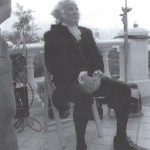
Herb Bermann in the role of George Washington in Mastercard’s 2002 and 2003 television ads. Photo by Edward French.
In the wake of his emergence from obscurity, in the 21st Century, he has resumed his acting career, appearing in several films, including the Roy Burdine directed Damage Done (2008), playing the role of Dad; on television, such as the Showtime program, Milk and Honey (2002); and most widely seen, in commercials, where he played George Washington in the Mastercard ads, Debit—The Date (2002) and Debit—Burned (2003).
During most of his adult, professional life, he lived in the former Rodeo Grounds at the mouth of Topanga Canyon, in the midst of the artist colony there, in a home previously occupied by Humphrey Bogart and Peter Lorre, surrounded by other actors, musicians and artists all living out a Bohemian, liberated, and extraordinarily creative and productive lifestyle. [For those interested in hearing more concerning Mr. Bermann’s time in the Rodeo Grounds, you can access a video online in which he reads his composition, Colophon, about the Rodeo Grounds, at https://www.youtube.com/watch?v=c1tfmL3HKbQ, part of the Brass Tacks media collection, Goodbye to the Rodeo Grounds. The text of Colophon is included among The Mystery Man from The Magic Band‘s Appendix documents.]
Herb Bermann is no longer a mystery, a mythical invention of Captain Beefheart/Don Vliet, hidden in obscurity. He now is recognized with entries in Wikipedia (“Herb Bermann is an American lyricist, screenwriter, and actor. . . .”, https://en.wikipedia.org/wiki/Herb_Bermann) and IMDB (“Herb Bermann is a writer, known for S.W.A.T. (1975), Wonder Woman (1975) and Medical Center (1969). . . .”, https://www.imdb.com/name/nm1250322/?ref_=nv_sr_srsg_0).
The book, The Mystery Man from The Magic Band, like its prime subject, is unusual, atypical, unique. It’s not your normal dry prose chronological biographical exposition of an artist’s life. Rather it is an interesting collection of bits and pieces of things written about or by the artist, which together weave a fascinating and effectively comprehensive picture of this unique talent’s career.
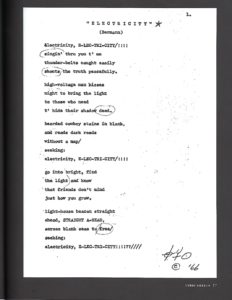
Herb Bermann’s original lyrics sheet for the song Electricity from the 1967 Captain Beefheart debut album, Safe As Milk.
For musicologists and cult fans of Captain Beefheart and His Magic Band, it is invaluable, for it presents original lyric sheets prepared by Mr. Bermann, not just of the eight Safe As Milk songs, but lyric sheets for a total of 64 songs, some of which have been recorded and marketed, and many others which have never seen the light of day before.
The collection of penned works include a warm-hearted forward by Mr. Bermann’s long time friend, actor Alec Baldwin; an informative introduction by Magic Band drummer John “Drumbo” French; an extensive interview of Mr. Bermann about his career, life, and work for Captain Beefheart by journalist, Derek Laskie, along with Mr. Laskie’s explanatory introduction to the interview; an Appendix presenting an assortment of relevant historical documents, providing hard evidence of elements of Mr. Bermann’s career; and a treasure trove of engaging photographs depicting various moments from Mr. Bermann’s life and career. All in all, it paints a vibrant picture of the creative life of an intriguing, original, innovative artist. It is an interesting, entertaining and captivating read, especially at this time when the worldwide coronavirus pandemic has deprived us of fresh theatre, musical concerts and new motion pictures, and compelled us to remain isolated at home.
